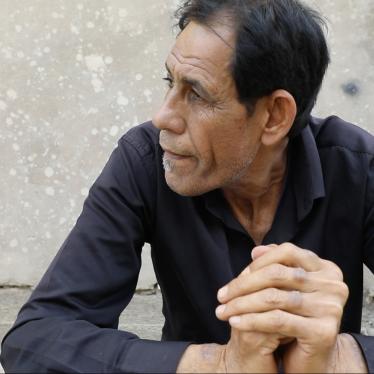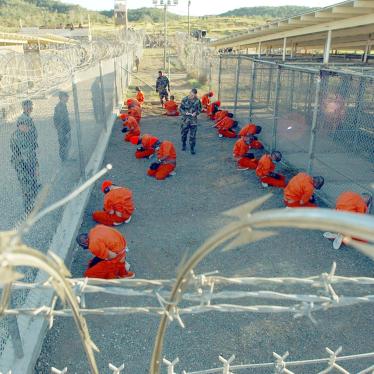Five years after President Bush opened the hastily built detention center at the U.S. Naval Base in Guantanamo Bay, Cuba, nearly 400 men, so-called unlawful enemy combatants, remain trapped there.
The continued detention of hundreds of men without charge has become a rallying cry of the Bush administration's critics. The administration's response has been to shroud its actions even further in secrecy and eliminate one of the most important mechanisms for keeping the government honest -- access to courts.
With a new Congress about to take over, it's time to set U.S. policy on a new course. The first order of business should be the reinstatement of the nation's basic checks and balances and restoration of one of the most important elements of American justice: habeas corpus.
Known as the "Great Writ," habeas corpus is the legal proceeding that allows prisoners to challenge the legality of their detention. It is designed to protect against arbitrary arrest and detention, and ensure a judicial check on a government's ability to arrest and detain.
It is a right so ancient and fundamental to Western society that it was enshrined in early English law, establishing the principle that even the king is bound by law. Thomas Jefferson called it one of the essential components of a free nation. Alexander Hamilton described it as an indispensable protection against arbitrary government.
Even George Bush called it "a heckuva writ."
But legislation passed by the outgoing Congress stripped away this basic right for any non-citizen determined by the president to be an "unlawful enemy combatant." This is an enormous expansion of presidential power with terrifying implications.
Any of the 11.6 million legal residents in this country -- including green-card holders who have been in the United States for decades -- could be declared an unlawful enemy combatant by the president, thrown into military custody, and denied the chance to contest his detention before an independent court. Neither the detainee nor his or her family would even have the right to be shown the evidence against them.
The administration insists that it has not -- and will not -- abuse its power. It claims that it is holding dangerous terrorists and that the courts should not interfere with the president's broad authority as commander in chief.
But habeas corpus is not interference. It is a mechanism for keeping the government honest. If the administration's narrative is true -- that the detainees in U.S. custody pose the threat to American security that the administration claims they do -- then it has nothing to fear. Habeas hearings will confirm the administration's allegations and silence many of its critics.
But if the administration's claims are false, then it is possible that the United States has been holding innocent men, many of whom have already been locked up for five years without any opportunity to know or contest the basis of their detention before a military or civilian court.
There is good reason to think that the administration has abused its power and may be holding the wrong men. Evidence suggests that many of the detainees at Guantanamo Bay were sold to the United States by bounty hunters and rival clan members to settle vendettas.
Intelligence and military experts now suspect that the Pakistani government and others turned over to the United States a large number of insignificant Taliban fighters or entirely innocent people, even as it protected more important figures who had connections to Pakistani intelligence services or the money to buy their freedom.
If these experts are right, then the United States is less safe than the administration claims. Dangerous terrorists are on the loose, while the continued detention of potentially innocent men provides a false sense of security. Habeas proceedings could expose what may have been a fundamental flaw in U.S. counterterrorism policy. And the administration's attack on habeas may really be an attempt to cover up its incompetence and intelligence failures.
Giving the detainees their day in court will require the expenditure of time and money. But these are resources well worth spending. Proving to a skeptical world that the detainees are who the president says they are will restore faith in the United States. And if the detainees are not who the administration says they are, Americans have a right to know.
The fight against terrorism is to a large extent a fight for hearts and minds. Restoring habeas should be an easy first task for the new Congress. It will reinstate the U.S. moral authority needed to successfully combat terrorism, prevent a gradual slide toward tyranny and send a message to the president that he is not above the law.







